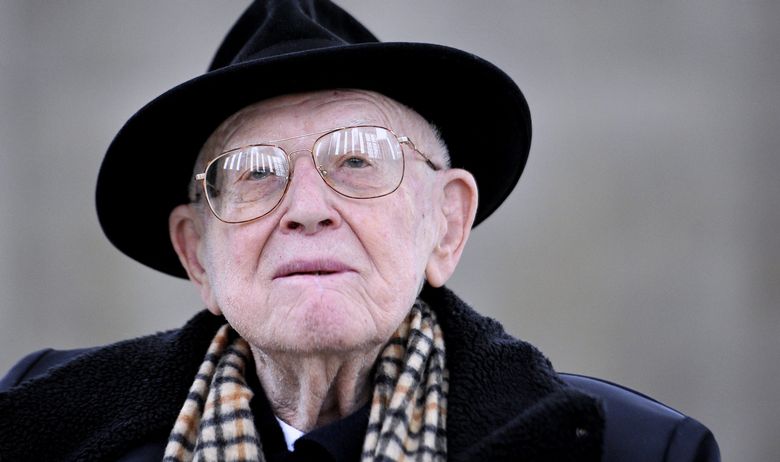Branko Lustig, who has
died aged 87, holds the distinction of being the only Holocaust survivor to
have subsequently won multiple Academy Awards as a film producer.
His first Oscar was presented for Schindler’s List (1993), Steven Spielberg’s adaptation of the Thomas Keneally novel about the German industrialist whose factory provided sanctuary for a thousand Jews during World War II. Upon meeting Spielberg to discuss the project, Lustig rolled his sleeve up to reveal the tattoo that marked him as prisoner number 83317. In a moment that sealed a long-standing affiliation, Spielberg kissed Lustig’s arm and insisted “You will be my producer”.
The film involved an arduous shoot, demanding the recreation of not just the camps but some of history’s direst episodes, yet it succeeded in setting the horrors of the Holocaust before a new generation; the attention it received from critics and awards groups seemed almost incidental.
Accepting his Oscar at L.A.’s Dorothy Chandler Pavilion in March 1994, Lustig declared “It’s a long way from Auschwitz to this stage… I hope I fulfilled my obligation to the innocent victims of the Holocaust.” He donated his statuette to the Yad Vashem, Israel’s Holocaust memorial, and alongside Spielberg initiated a project at the Shoah Foundation to collect the testimonies of a further 50,000 survivors.
Branko Lustig was born on June 10, 1932 in the Yugoslavian city of Osijek to Croatian Jewish parents. Neither his waiter father Mirko nor his mother Vilma were especially devout, but the young Branko was often taken to synagogue by his grandparents.
He was deported, along
with the rest of his family, when he was twelve years old. He had barely
arrived at Auschwitz when he saw prisoners being put to death at the gallows.
On Oscar night fifty years later, he vividly recalled the words the condemned
cried out to onlookers: “Bear witness. Tell the story of our murder. Remember.”
At Auschwitz, he was assigned to open and close the camp’s front gates, inscribed with the deathly legend Arbeit Macht Frei. He attributed his survival to a bond struck up with a German officer who noticed him crying one day, and asked where he was from: it transpired the officer was from the same suburb of Osijek, and that he knew the boy’s father.
He spent two years at Auschwitz and Belsen-Bergen, where his grandmother died in the gas chambers. At liberation, the 13-year-old Lustig weighed just 66 pounds, and was so delirious from typhoid he believed he’d died upon hearing the bagpipes of his British liberators: “I thought, ‘I’m in heaven finally, and these are angels playing.’”
He was eventually reunited with his mother, though most of his family did not survive. (His father died at Čakovec in March 1945.) Of a Croatian Jewish community that numbered 39,000 in the pre-war period, only 9,000 returned to their homes.
After the war, Lustig studied at Zagreb’s theatrical academy and began working for the state-owned studio Jadran as a translator and production assistant. He apprenticed on local productions, often with a WW2 theme – earning an onscreen cameo in Kozara (1962) as a wounded German soldier – but soon became a valuable contact for overseas crews looking to showcase Yugoslavia’s natural beauty.
He took an assistant director credit on The Tin Drum (1979), and served as production supervisor for the Yugoslavian sequences of Sophie’s Choice (1982), before enjoying his first hit as an associate producer with the ABC miniseries The Winds of War (1983), an adaptation of Herman Wouk’s novel set in the months before Pearl Harbor, starring Robert Mitchum and Ali McGraw.
Its sequel War and Remembrance (1988-89) was notable for being the first commercial project to gain permission to shoot at Auschwitz, a point on which Lustig was insistent: “It is terribly important we make this picture here, because people are forgetting what happened.”
After Schindler’s List, Lustig joined the Spielberg-backed studio DreamWorks, overseeing the George Clooney/Nicole Kidman thriller The Peacemaker (1997) as well as forging a fruitful alliance with Ridley Scott, producing Gladiator (2000), for which he won his second Oscar, as well as Hannibal (2001), Black Hawk Down (2001), Kingdom of Heaven (2005) and American Gangster (2007).
He formed his own company, Six Point Film, in 2008, and in May 2011, aged 78, he returned to Auschwitz to celebrate the bar mitzvah denied to him as a 13-year-old boy. He received the Sarajevo Film Festival’s Heart of Sarajevo award in 2012 and served as honorary president of Zagreb’s Tolerance Festival, part of a homecoming that also saw him win a seat in the Zagreb Assembly in 2017.
His last completed film project was the Igor Prizmic-directed documentary short May It Never Be Forgotten (2015), in which Lustig revisited Auschwitz with University of Zagreb students to plant a Croatian flag at the site, as part of its annual March of the Living; it screened on Croatian television the night of his death.
In a Los Angeles Times interview twenty years after Schindler’s List, Lustig spoke of the growing need to preserve his fellow survivors’ experiences for future generations: “Slowly, people are not making movies about the Holocaust. One day, they will stop… Maybe the reason I survived the camps was to help make movies about them, to show what happened.”
He is survived by his spouse Mirjana and daughter Sara.
Branko Lustig, born June 10, 1932, died November 14, 2019.

No comments:
Post a Comment